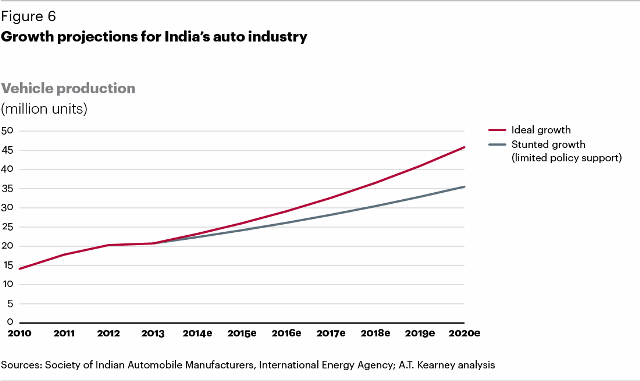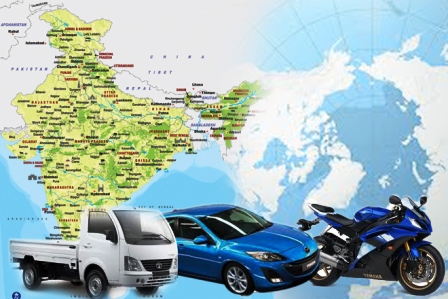If Nigeria were to follow the route that India has adopted and effectively stop used car imports, the effect on the Nigerian economy would be substantial with an increase in home based manufacturing, observes PHILOMENA EDGAR
[dropcap]I[/dropcap]ndia is a strange country. It has 22 official languages. According to the Census of India, the total number of mother tongues spoken in India is 1652; whilst Nigeria has 521 languages currently spoken (at least nine of them are now extinct). So Nigeria is ahead of India in major or official spoken languages.
But sadly, that is probably all Nigeria leads in terms of competitiveness with India. Why? It is simple. Nigeria is a major export market for India. Companies like Bajaj and TVS export more products to Nigeria than to any other country in the world. The Bajaj Boxer is an example, a motorcycle that ceased to sell in India some thirty years ago, because no one would buy it.
 It is an old fashioned, obsolete product that no sane person in India would buy. It has an engine that was designed in the 1950s, a petrol-hungry, old 4-speed gearbox and dangerous spoked wheels (that are not sold in India). It is an example of how India keeps a mass production line working to export obsolete, archaic, and effectively old technology to Nigeria.
It is an old fashioned, obsolete product that no sane person in India would buy. It has an engine that was designed in the 1950s, a petrol-hungry, old 4-speed gearbox and dangerous spoked wheels (that are not sold in India). It is an example of how India keeps a mass production line working to export obsolete, archaic, and effectively old technology to Nigeria.
 Bajaj are clever in their marketing, portraying the Boxer as easy to repair and strong. In reality nothing could be further from the truth. The bike is easy to repair yes and parts are readily available with Bajaj importing millions each month. If it was a modern age design such as the Haojue Elegant or Suzuki Hayate, it would require far less maintenance. Why do Nigerians buy such old fashioned Indian motor cycles like the Boxer, Cruz and Star? I do not know the answer. Do you?
Bajaj are clever in their marketing, portraying the Boxer as easy to repair and strong. In reality nothing could be further from the truth. The bike is easy to repair yes and parts are readily available with Bajaj importing millions each month. If it was a modern age design such as the Haojue Elegant or Suzuki Hayate, it would require far less maintenance. Why do Nigerians buy such old fashioned Indian motor cycles like the Boxer, Cruz and Star? I do not know the answer. Do you?
India also has stringent restrictions on the importation of used cars; currently the duty rate payable is 196%, plus shipping costs. This firm policy, introduced many years ago, has resulted in India having an incredibly strong new car manufacturing base. Companies such as Honda, Hyundai, Maruti Suzuki, Renault, Audi, Fiat, Skoda, even Mercedes and BMW manufacture in India. In fact, BMW and Mercedes also manufacture their engines for these cars in India, so the products are truly home produced.
The quality matches that of the original countries of origin and India proudly announce that they are exporting cars to the UK, where a buyer thinks he is buying a French Renault/Dacia Duster or Korean Hyundai i20 or indeed most of the Suzuki range, is actually buying a fully manufactured Indian product. When driving in Lagos I am saddened to see huge amount of imported used cars. According to various websites, it is estimated that possibly as much as 500,000 used cars are imported into Nigeria annually. I carried out an exercise to gauge how large the market was. I googled ‘buy used cars from USA’ and numerous websites appeared, many offering damaged cars.
I entered my contact details on one of the sites and within 15 minutes received a phone call from a North American call centre. I engaged the girl called Amy in conversation. She said she was employed with the rest of the team in calling interested customers in Africa. She went on to detail how I could select from 1000s of used damaged or repaired cars from their website and that once I had selected my car they would take care of all the shipping for a small charge and all I had to do was get the car released when it arrived at the port in Lagos. I thanked her for her time and said I would let her know. Over the last four weeks.
I have received five more calls from the call centre, asking me to place an order and also numerous emails asking the same. This is clearly a big business. My observation is that if Nigeria were to follow the route that India has adopted and effectively stop used car imports, the effect on the Nigerian economy would be substantial with an increase in home based manufacturing. An infrastructure would be in place to distribute and sell the vehicles. Sub-contractors would be needed to manufacture components locally such as headlamps, tyres, seats, etc. In fact the list is endless, and the business model proven as India has demonstrated.
Lastly there is another huge benefit and I mention this last because for the future of our children. It is probably the most important. Our carbon emissions would be lower, much lower because we are not bringing in some else’s trash or old damaged cars which we see on our roads belching out smoke and soot. Instead we would be manufacturing new, low emission vehicles which are 100s of times less polluting. QED.
PHILOMENA EDGAR, an international auto industry analyst based in Lagos, Nigeria, now writes for Motoring World International





